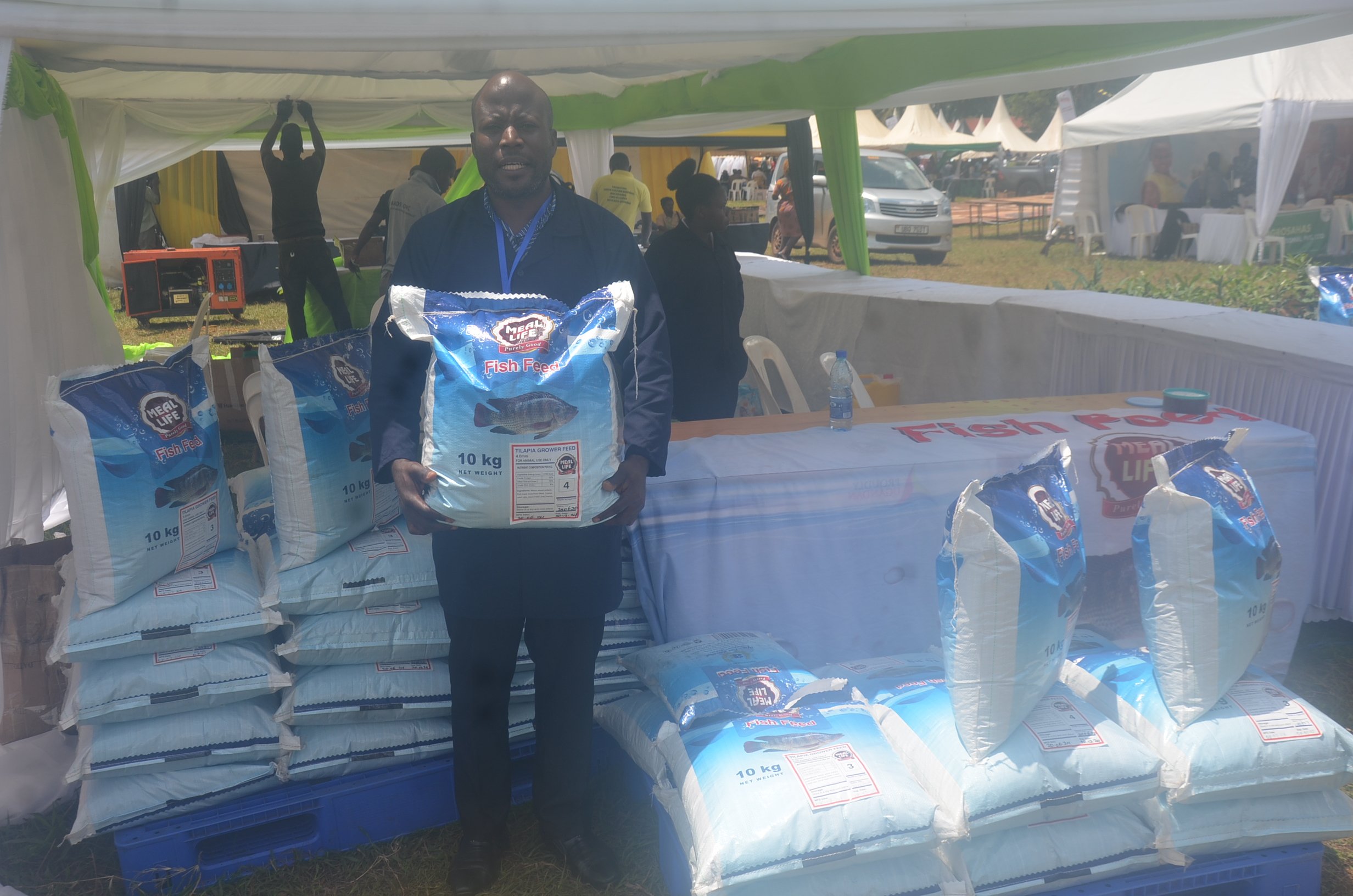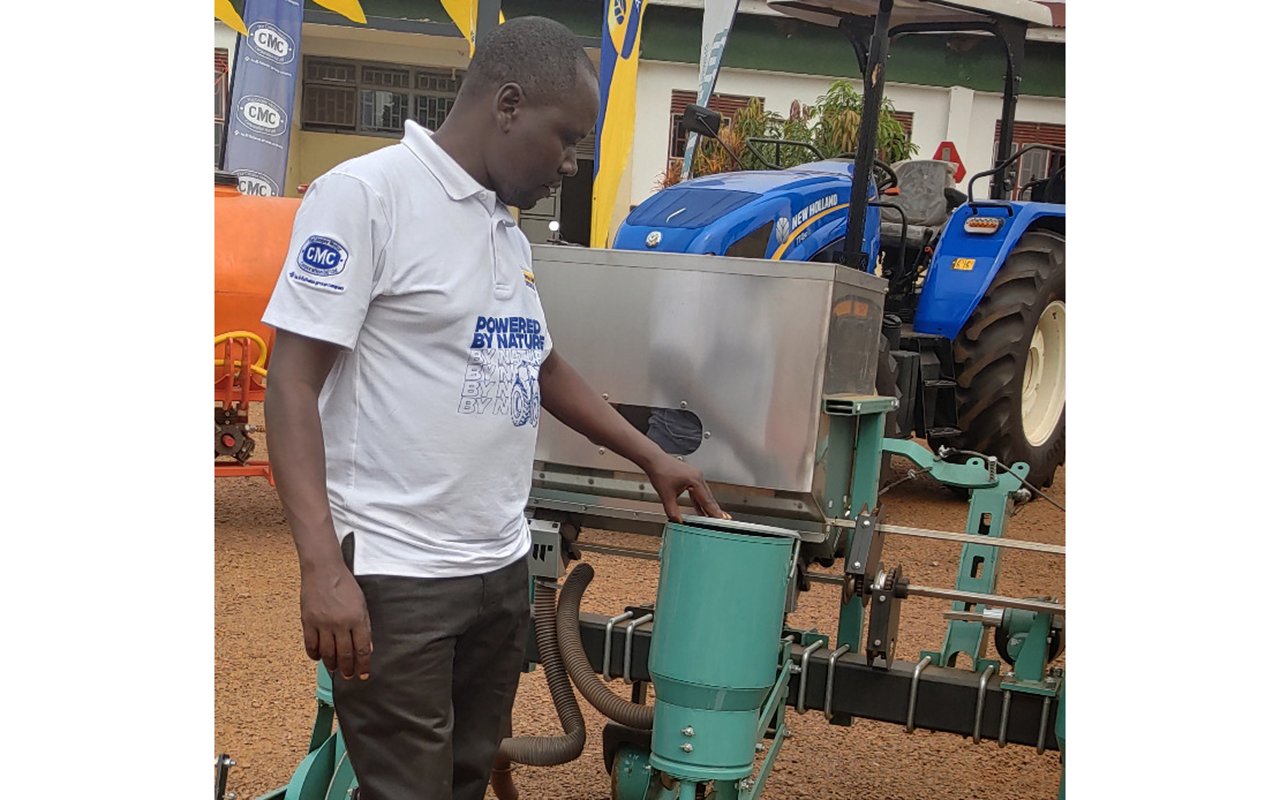Prime
Jinja Farmers’ show: Exhibitor stocks 600 bags of fish feeds, sells one

Moses Bwanika says he is stuck with his 599 bags of fish feeds. He had 600 but sold only one in the Jinja Agriculture show. PHOTO/TAUSI NAKATO .
What you need to know:
- Show manager Peter Kisambira conceded that the turn up for this year’s edition was low.
Exhibitors at the 30th edition of the Source of the Nile National Agricultural Show say they have registered record losses, blaming organizers for splitting the event.
The annual show held under the theme: “Innovating Pathways To Farm Business-led Agro Industrialisation”, was officially opened on July 24 by State Minister for Agriculture, Animal Industry and Fisheries, Bright Rwamirama and closed on August 4 by First Deputy Prime Minister, Rebecca Kadaga.
However, most exhibitors interviewed for this article say they have recouped nothing for their efforts over the past ten days at Jinja Showground in Jinja City.
For instance, Moses Bwanika, the Managing Director Afro-Kai Limited, which deals in fish feedssays he has registered “a big loss” after reportedly stocking 600 bags for the show, but only sold one.
“I now have to incur more expenses transporting back almost all the stock I came with to the show. I spent money and time during the show, but gained nothing over the past ten days,” Bwanika lamented on Sunday.
He attributed the loss to having one show entirely for students and the other for farmers.
For the third successive year, organisers, the Uganda National Farmers’ Federation (UNFFE), have separated the shows, citing farmers’ alleged failure to learn from the exhibitors due to “overcrowding” by the students.
Donald Mugisha, the sales manager of biogas dealers Detra Energy and Environment, said most of his items were bought by fellow exhibitors, suggesting that the next show lasts for at least two weeks with only one edition.
The Director Capital Feeds which deals in poultry and animal feeds supplements in Jinja City, Wilfred Piro, didn’t exhibit this year for fear of losses.
He, however, said for the last 18 years he has attended the show, it was usually filled to capacity compared to the latest one.
“The purchasing power was previously high compared to these years (2022, 2023 and 2024) when it was separated. The show must be combined, but purely for agriculture,” he said.
He further suggested that show-goers be subjected to a one-off payment for the entire period of the show, instead of paying each time they want to access the venue.
“Even the entry fee should be reduced from Shs5000 to Shs3,000 because it is a government show and sponsored,” he advised.

Workers of RNJ power Center ,which deals in agriculture machinery, load all items on the truck after the show flopped. PHOTO/TAUSI NAKATO
The Director RNJ power Centre, John Ndiwalana, noted that he spent ten days at the show, but the organisers didn’t advertise.
“I have made a loss of 90 percent, and I am shunning it next year. Students should attend with their parents because they (students) can’t afford buying the seedlings,” Mr Ndiwalana said.
He added that the ten days during which the show usually lasts are “many”, arguing that as exhibitors, they always arrive before the actual show starts to prepare.
The Managing Director Down Magic Sales Centre which deals in electric appliances, Ms Emmy Twebaze, said the low turn up of show-goers left her with unsold stock of about 40 percent compared to last year.
She said: “During the last year’s show, we sold all the items in our stall, but as you can see here, because few people turned up, we have remained with 40 percent of the items we brought for exhibition.”
Martha Lwamiti, one of the exhibitors, said most established colleagues shunned the show because of the losses they have been incurring since one show was set aside for students and another for the farmers.
According to her, companies like MTN, Bell, Movit and Nivea used to boost the show, which is no longer the case because most exhibitors, especially more established, are no longer unveiling their merchandise yet they used to attract many show-goers with their free offers.
The Marketing Office Masindi Seed Company, Mr Clovis Bagonza, said last year, they brought about three tons of seeds and sold out; however, this year, less than half of the seeds brought remained in the store, a shift he attributed to poverty and low turn up among show-goers.
Organisers speak out
Show manager Peter Kisambira conceded that the turn up for this year’s edition was low, but said they hope to evaluate suggestions presented by exhibitors and come up with a conclusion.
He, however, revealed that this low turn up is always expected for the second show that is exclusively held for the farmers.




